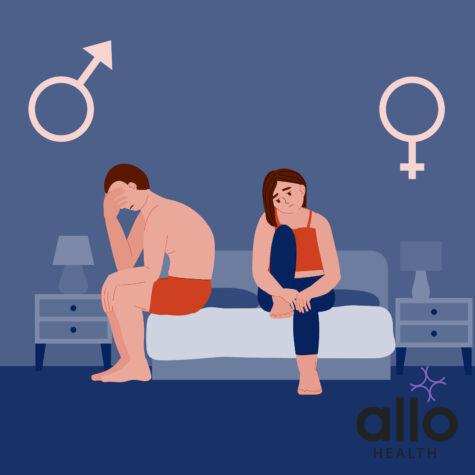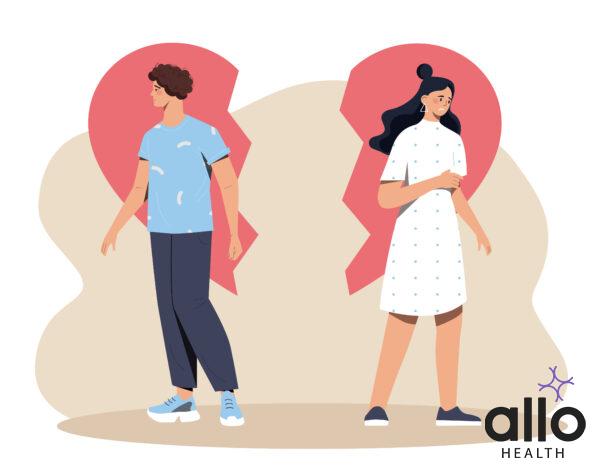Know Everything About Unconsummated Marriage

Allo Health is dedicated to personalized well-being, offering support and trusted information tailored to individual health goals. The platform emphasizes human-generated content, led by a distinguished medical team of experts, including physicians and sexual health specialists. Their commitment to credibility involves rigorous fact-checking, authoritative research, and continuous updates to ensure accurate, up-to-date information. Allo Health's unique approach goes beyond conventional platforms, providing expert-led insights and a continuous commitment to excellence, with user feedback playing a crucial role in shaping the platform's authoritative voice.

Ms Rachel graduated with a MSc. in clinical psychology from CMR university, Bangalore. With close to two years of experience in the field of Child and Adolescent Psychology.
Why This Was Upated?
Our experts continually monitor the health and wellness space, and we update our articles when new information became available.
Updated on 18 June, 2024
- Article was updated as part of our commitment to diversity, equity, and inclusion.

"The following blog article provides general information and insights on various topics. However, it is important to note that the information presented is not intended as professional advice in any specific field or area. The content of this blog is for general educational and informational purposes only.
Book consultation
The content should not be interpreted as endorsement, recommendation, or guarantee of any product, service, or information mentioned. Readers are solely responsible for the decisions and actions they take based on the information provided in this blog. It is essential to exercise individual judgment, critical thinking, and personal responsibility when applying or implementing any information or suggestions discussed in the blog."
Love stories have always fascinated us with their tales of strong emotions, deep connections, and unbreakable bonds between two people. But hidden within these stories, there is a topic that is rarely talked about: unconsummated marriage. Behind closed doors, many couples silently struggle with the profound challenge of a love that has not found its physical expression.
In this article, we will explore the complexities of unconsummated marriages, trying to understand why this happens and shedding light on the emotional struggles involved. We will also discuss possible ways to resolve this issue. So, let’s embark on this journey together as we uncover the layers of desire, intimacy, and the human heart’s longing for connection.
What is An Unconsummated Marriage?

Unconsummated marriage means that in a marital relationship, the couple has not engaged in sexual activity or has been unable to consummate their marriage through sexual intercourse.
It can be a complex issue with various factors contributing to the lack of sexual relations between the partners. At large, the society pertains a huge stigma when it comes to marriages like these. The insecurity and embarrassment while experiencing an unconsummated marriage is also somewhat influenced by the societal expectation of a “honeymoon period” for a newlywed couple.
Why Unconsummated Marriages Happen?
An unconsummated marriage can happen due to many reasons including lack of sexual experience or knowledge about sex, cultural and societal taboos, difficulty in sexual stimulation, past trauma of sexual abuse, male sexual concerns like Erectile Dysfunction and Premature ejaculation, female factors including lack of arousal, low libido etc.
It is important to address these factors in detail.
Physical health issues: Physical health conditions or complications can contribute to difficulties in achieving sexual intimacy. Conditions such as erectile dysfunction, vaginismus, hormonal imbalances, chronic pain, or other sexual dysfunctions may affect a person’s ability to engage in sexual activity.
Psychological factors: Psychological factors play a significant role in sexual intimacy. Anxiety, performance anxiety, past trauma, body image concerns, low self-esteem, or depression can create barriers to sexual intimacy. Fear, guilt, or shame associated with sex can also contribute to unconsummated marriages.
Lack of sexual education and experience: Limited knowledge about sexual anatomy, sexual functioning, or a lack of understanding about one’s own or their partner’s body can hinder the ability to engage in sexual activity. Insufficient sexual education or cultural and religious beliefs that discourage sexual exploration can contribute to a lack of knowledge and confidence in this area.
Communication barriers: Communication is essential for a healthy sexual relationship. Lack of open and honest communication about desires, expectations, fears, or concerns can create misunderstandings or inhibit the exploration of sexual intimacy. Difficulties in discussing sensitive topics related to sex may prevent couples from addressing the issue.
Cultural and religious beliefs: Cultural or religious beliefs and values can influence attitudes towards sex and may create obstacles to sexual intimacy. Societal or religious norms that place emphasis on virginity, modesty, or sexual abstinence before marriage may contribute to feelings of guilt, anxiety, or discomfort when attempting to engage in sexual activity.
Relationship issues: Unresolved conflicts, emotional distance, lack of trust, or other relationship issues can impact a couple’s ability to establish sexual intimacy. Emotional disconnect or dissatisfaction within the relationship may translate into difficulties in the sexual aspect of the marriage.
Physical incompatibility: Physical incompatibility, such as differences in sexual desire, libido, or sexual preferences, can create challenges in achieving sexual intimacy. Mismatched expectations or desires regarding frequency, intensity, or types of sexual activity can contribute to an unconsummated marriage.
It’s important to note that the reasons for unconsummated marriages can vary significantly from couple to couple, and individual circumstances may influence the specific factors at play. A multidisciplinary approach involving medical professionals, therapists, and sexologists can provide comprehensive support to couples facing difficulties in consummating their marriage.
Physical and Emotional Impact of An Unconsummated Marriage

The physical and emotional impact of an unconsummated marriage can be significant for both partners. Here is the information incorporating the requested keywords:
Physical Impact
Sexual Pain Disorders: Unconsummated marriages can be associated with sexual pain disorders, such as dyspareunia or vaginismus, where intercourse is painful or difficult. Oral therapies, including medication or topical treatments, may be recommended to address these conditions and promote pain-free intercourse.
Fear of Pain: The fear of experiencing pain during intercourse can create anxiety and anticipation, leading to physical tension and further exacerbating the issue. This fear can interfere with arousal and sexual response, making it challenging to consummate the marriage.
Painful Intercourse: In an unconsummated marriage, attempts at intercourse may result in pain for one or both partners. This can lead to negative associations with sex, reduced sexual desire, and avoidance of sexual activity. Addressing the underlying causes of painful intercourse is essential for resolving the unconsummated marriage.
Emotional Impact
Emotional Distress: An unconsummated marriage can cause emotional distress for both partners. Feelings of frustration, disappointment, guilt, inadequacy, or shame may arise due to the inability to engage in sexual intimacy. These emotions can strain the relationship and contribute to a sense of emotional distance.
Self-Esteem and Confidence: The inability to consummate a marriage can negatively impact self-esteem and sexual confidence for both partners. It may lead to doubts about attractiveness, sexual ability, or desirability, further affecting one’s sense of self-worth and hindering the development of a healthy sexual relationship.
Relationship Strain: An unconsummated marriage can place strain on the overall relationship. The lack of sexual intimacy can lead to emotional disconnection, feelings of dissatisfaction, and resentment. Communication difficulties, frustration, and misunderstandings related to the unconsummated status can contribute to relationship conflict and distress.
It is important to note that addressing the physical and emotional impact of an unconsummated marriage often requires a multi-dimensional approach. Seeking professional help from therapists, counselors, or sex therapists can provide the necessary support, guidance, and knowledge of sexual health to address these issues effectively.
How To Know If You Have An Unconsummated Marriage?
Diagnosing an unconsummated marriage typically involves a thorough assessment of both the physical and psychological factors that may be contributing to the issue. Here is a general framework for diagnosing an unconsummated marriage:
Clinical History: Obtaining a detailed clinical history from both partners is crucial to understanding the nature and duration of the problem.
The clinician may ask about the couple’s sexual history, previous sexual experiences, any traumas or sexual abuse history, medical conditions, and any attempts at sexual intercourse.
Physical Examination: A physical examination, particularly of the genital area, may be conducted to identify any physical abnormalities or conditions that could be causing pain or discomfort during intercourse.
For women, this may involve a gynecological examination to assess the condition of the vaginal area. For men, an examination of the genital organs may be performed.
Psychological Assessment: Assessing the psychological factors contributing to the unconsummated marriage is essential. This may involve exploring any underlying emotional issues, relationship problems, past traumas, or anxiety disorders that could be affecting sexual functioning.
The clinician may use various assessment tools, interviews, or questionnaires to evaluate the psychological aspects of the problem.
Communication and Relationship Assessment: Understanding the dynamics of the couple’s relationship and their ability to communicate openly about their sexual concerns is vital.
The clinician may explore the couple’s level of trust, emotional intimacy, and communication patterns to identify any relationship issues that may be affecting their ability to consummate the marriage.
Referrals and Collaborative Care: Depending on the specific circumstances, the clinician may refer the couple to specialists such as sex therapists, psychologists, gynecologists, urologists, or other relevant healthcare professionals.
A multidisciplinary approach involving professionals from different fields may be necessary to address the complex factors contributing to the unconsummated marriage.
It’s important to approach the diagnosis with sensitivity and empathy, creating a safe and non-judgmental space for the couple to share their concerns.
Each case may require an individualized approach, and the diagnosis should take into account the unique circumstances, cultural background, and personal beliefs of the couple.
Additionally, it’s crucial to respect the couple’s autonomy and choices. Not all unconsummated marriages necessarily require medical intervention or consummation if the couple has made an informed decision to abstain from sexual intercourse for personal or cultural reasons.
In such cases, providing support, education, and counseling to enhance the couple’s overall intimacy and relationship satisfaction may be more appropriate than solely focusing on consummation.
Effective Solutions For Unconsummated Marriage
While an unconsummated marriage can be a reason of off-strings between a couple, the good part is there are soltuions . And a lot of it. All it takes is a mutual amount of effort and compatibility from those two people willing to make it all work at the end.
Here are some management strategies you can resort to have a more healthy sex-enriched relationship-
Knowledge of Sex: Improving knowledge of sexual anatomy, sexual functioning, and sexual health can be beneficial for couples in an unconsummated marriage. Education about the physical and emotional aspects of sex can help dispel misconceptions, reduce anxiety, and promote a healthier understanding of sexual intimacy.
Therapy and Counseling: Seeking therapy or counseling from professionals with expertise in sexual health can be highly effective in addressing the challenges of an unconsummated marriage. Couples therapy or sex therapy can help improve communication, address emotional and psychological barriers, and develop strategies to overcome physical difficulties. Individual therapy may also be beneficial to address any underlying personal issues.
Medical Interventions: Depending on the specific circumstances, medical interventions may be recommended. For example, in cases of physical pain or sexual dysfunction, consulting with healthcare professionals, such as urologists, gynecologists, or sexual medicine specialists, can provide appropriate diagnosis and treatment options. Medications, topical treatments, or surgical interventions may be prescribed as needed.
Sensate Focus Exercises: Sensate focus exercises involve non-sexual touch and gradual progression towards sexual touch and intimacy. These exercises can help couples reconnect, build trust, and explore sensual experiences without pressure or performance anxiety. It allows partners to focus on pleasurable sensations and gradually work towards sexual intimacy.
Cognitive-Behavioral Therapy (CBT): CBT can be useful in addressing the psychological factors contributing to an unconsummated marriage. It helps individuals identify and challenge negative thought patterns, develop coping strategies for anxiety or fear, and replace unhelpful beliefs with healthier ones. CBT can be beneficial for reducing performance anxiety and improving overall sexual well-being.
Open Communication and Emotional Support: Establishing open and honest communication between partners is crucial. This includes discussing desires, fears, concerns, and expectations surrounding sex. Offering emotional support and creating a safe and non-judgmental space for both partners to express their needs and concerns can facilitate the process of resolving the unconsummated marriage.
Multidisciplinary Approach: A multidisciplinary approach involving healthcare professionals from various fields, including psychologists, sex therapists, gynecologists, and urologists, may be necessary to address the complex factors contributing to unconsummated marriages. This collaborative approach ensures a comprehensive assessment and personalized treatment plan tailored to the specific needs of the couple.
It’s important to note that the treatment approach should be individualized based on the specific circumstances and underlying factors contributing to the unconsummated marriage. Cultural factors, personal beliefs, and individual difficulties need to be taken into consideration while designing the treatment plan. Patience, empathy, and support are essential throughout the treatment process to create a safe and supportive environment for the couple.
Tips To Save An Unconsummated Marriage
Saving an unconsummated marriage requires open communication, understanding, and a willingness to work together as a couple. Here are some steps you can take to address the issue and potentially improve the situation:
Seek Professional Help: Consider seeking the guidance of a therapist or counselor experienced in dealing with sexual issues and relationships. Behavioural therapy, including cognitive-behavioral therapy (CBT), can be effective in addressing psychological barriers and providing strategies to overcome cultural taboos or personal inhibitions.
Open and Honest Communication: Create a safe and non-judgmental space for open communication between partners. Discuss feelings, concerns, and expectations surrounding sex and the unconsummated status of the marriage. Honest conversations can help build trust, foster understanding, and facilitate problem-solving. [Keywords not directly addressed]
Patience and Empathy: Recognize that resolving an unconsummated marriage may take time and patience. Be understanding and empathetic towards each other’s concerns and experiences. Support each other emotionally throughout the process, and avoid blaming or shaming one another.
Address Cultural Taboos: If cultural taboos or societal pressures are affecting the unconsummated marriage, it may be helpful to engage in discussions about these issues. Seek support from individuals or communities who can provide a more progressive and understanding perspective on sexual relationships. Challenging cultural norms and seeking alternative viewpoints can help overcome inhibitions and promote a healthier sexual relationship.
Seek Sex Education: If the unconsummated marriage is due to lack of knowledge or misconceptions about sex, consider attending sex education classes or workshops together. These educational opportunities can provide accurate information, debunk myths, and promote a healthier understanding of sexual intimacy.
Address psychological factors: If psychological factors, such as past trauma, anxiety, depression, or body image concerns, are contributing to the lack of sexual intimacy, consider seeking individual therapy for one or both partners. A trained therapist can help address these concerns and provide tools for managing and overcoming psychological barriers.
Explore alternative forms of intimacy: While sexual intercourse is a traditional aspect of physical intimacy, it’s important to remember that there are many ways to be intimate with your partner. Explore and prioritize other forms of physical and emotional intimacy, such as cuddling, kissing, holding hands, or engaging in activities that bring you closer together. Focus on building emotional connection and fostering intimacy in other ways while you work through the challenges.
Legal Implications of An Unconsummated Marriage
The legal implications of an unconsummated marriage can vary depending on the jurisdiction and the specific circumstances of the case. In general, however, an unconsummated marriage is still considered a valid marriage under the law, and the couple retains all of the legal rights and responsibilities of a married couple, including property rights, inheritance rights, and the right to file joint tax returns. But in cases otherwise, they can mutually resort to the following options:
Annulment: In some jurisdictions, an unconsummated marriage may be grounds for annulment. Annulment is a legal process that declares a marriage null and void, as if it never existed. The specific requirements for annulment vary by jurisdiction, but lack of consummation is often considered a valid reason.
Divorce: If annulment is not an option or if the couple does not meet the requirements for annulment, they may seek a divorce instead. Divorce is the legal termination of a marriage. In this case, the unconsummated nature of the marriage may be relevant in terms of dividing assets, determining spousal support, child custody, and other legal matters related to the dissolution of the marriage.
Legal implications for spousal rights: An unconsummated marriage may have implications for spousal rights and obligations, such as inheritance rights, property division, and financial responsibilities. Again, the specific legal consequences will depend on the jurisdiction and applicable laws.
Cultural and religious considerations: In some cultures and religions, consummation of marriage is seen as an important aspect of marital obligations. Failure to consummate the marriage may have religious or cultural implications, which can vary significantly depending on the specific beliefs and customs.
It’s important to note that laws and customs regarding marriage and its consummation can vary widely across different countries and legal systems. Therefore, it’s advisable to consult with a legal professional or family law expert who is familiar with the specific jurisdiction in question to obtain accurate and up-to-date information.
How Does One Seek Support If They’re Experiencing An Unconsummated Marriage?
If you or someone you know is experiencing an unconsummated marriage or an unconsummated relationship, it’s important to seek support and guidance. Here are some steps you can take:
Couples therapy or marriage counseling: Consider seeking the help of a qualified therapist or counselor who specializes in working with couples. They can provide a safe and supportive environment to explore the issues and challenges within the relationship, including the lack of sexual intimacy. A therapist can help facilitate communication, address underlying concerns, and guide you towards solutions.
Sex therapy: Sex therapy is a specialized form of therapy that focuses on addressing sexual issues and improving sexual intimacy. A sex therapist can help you and your partner understand and navigate the factors contributing to the unconsummated marriage. They can provide guidance, education, and exercises to help overcome physical or psychological barriers to sexual intimacy.
Physical therapy: In cases where there are physical health issues contributing to the lack of sexual intimacy, consulting with a physical therapist, specifically a pelvic floor therapist, may be helpful. They can provide treatments, exercises, and techniques to address physical concerns, such as vaginismus or erectile dysfunction, and improve sexual function.
Seek medical evaluation: If there are physical issues affecting sexual intimacy, it may be beneficial to consult with a healthcare professional specializing in sexual health, such as an andrologist or gynecologist. They can assess any underlying medical conditions, provide appropriate treatment options, or refer you to a specialist if necessary.
Overall, seeking support for an unconsummated marriage is an important step in addressing the emotional and practical challenges that can arise. By taking proactive steps to address the issue, you can work towards building a stronger, more fulfilling relationship with your partner.
Frequently Asked Questions
Q. Is lack of sexual desire always the cause of an unconsummated marriage?
A. No, lack of sexual desire is not always the cause of an unconsummated marriage. There can be various factors contributing to the issue, such as physical health problems, psychological factors, communication barriers, cultural or religious beliefs, or relationship issues.
Q. Is it possible to overcome an unconsummated marriage and achieve a fulfilling sexual relationship?
A. Yes, with proper support, understanding, and willingness from both partners, it is possible to overcome an unconsummated marriage and work towards a fulfilling sexual relationship. Through therapy, education, communication, and addressing underlying issues, couples can enhance their intimacy and create a more satisfying sexual bond.
Q. Can an unconsummated marriage affect other aspects of the relationship?
A. Yes, an unconsummated marriage can potentially impact other aspects of the relationship. The lack of sexual intimacy may lead to emotional distance, frustration, or feelings of inadequacy. It can also create strain and tension in other areas of the relationship, such as communication, trust, and overall satisfaction. Resolving the unconsummated marriage can positively impact the overall relationship dynamics.
Q. Is it necessary to disclose an unconsummated marriage to family or friends?
A. Whether or not to disclose an unconsummated marriage to family or friends is a personal decision. It depends on factors such as cultural norms, individual comfort levels, and the nature of the relationship with family and friends. Some couples may choose to seek support and guidance from trusted individuals, while others prefer to keep it private.
In conclusion, an unconsummated marriage can be a challenging and sensitive issue for any married woman and her partner. The experience of honeymoon impotence, hasty attempts at coitus, or other factors can lead to frustration and emotional distress. However, it’s important to remember that this is not an uncommon situation, and there are resources available to help navigate these difficulties.
Seeking support from andrology clinics, exploring experiences before the wedding, or discussing the topic with close allies can provide valuable insights and guidance. Don’t hesitate to reach out for assistance, as there are professionals and resources ready to provide the necessary support. You are not alone, and there is hope for a happier and more satisfying future together.







































